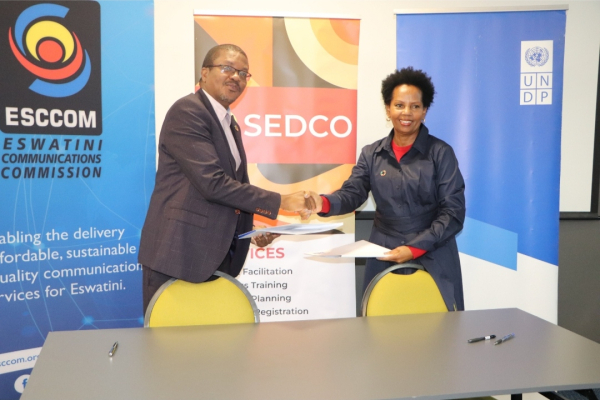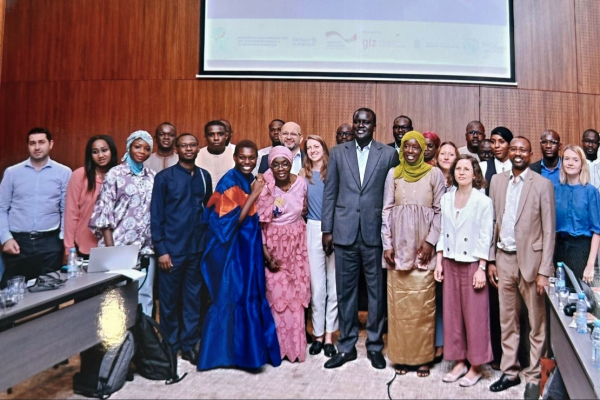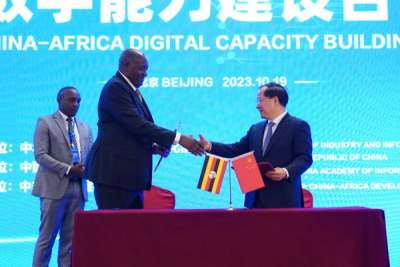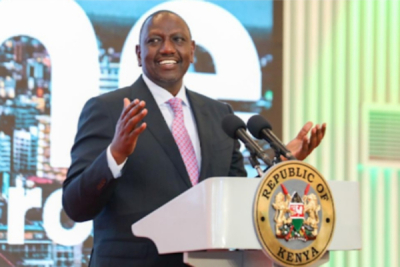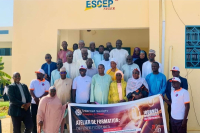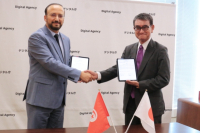
Public Management (596)
To accelerate the realization of their digital ambitions, governments are teaming up with reliable and experienced partners to get technical support for some projects.
On Wednesday, November 1, the Eswatini Communications Commission (ESCCOM) and the United Nations Development Programme (UNDP) signed a memorandum of understanding at the United Nations House in Mbabane.
According to a UNDP press release, the agreement aims, among other things, to improve universal access to affordable ICT services; provide digital services and other government functions; and support the effective implementation of the national digital strategy developed under ESCCOM's leadership.
"This agreement will play a pivotal role in accelerating our progress towards achieving the Sustainable Development Goals. These goals encompass vital indicators such as reducing youth unemployment, bolstering food security, broadening access to ICTs, digitizing services, and fostering financial inclusion throughout Eswatini," said Mvilawemphi Dlamini (photo, left), ESCCOM's Chief Executive Officer.
The agreement calls for the creation of iHubs (innovation hubs) and digital technology action centers to deepen digital inclusion and improve youth employability. These centers will be designed as one-stop shops for ICT training, business development, business relations, financial services, and business mentoring.
The agreement is part of ESCCOM's efforts to develop digital technology and reduce the digital divide in the country. In June, ESCCOM announced the signature of a telecoms agreement with the Mozambique Communications Regulatory Authority (INCM). Ultimately, the agreement with the UNDP will, among other things, help reduce the digital divide in Eswatini, with a focus on marginalized people, notably young people, women, and the disabled.
Samira Njoya
The coronavirus pandemic accelerated digital transformation initiatives across Africa but, some countries, like Senegal, were already embarked on that path long before the pandemic. They are still pushing ahead with numerous initiatives.
Senegal's Ministry of Communication, Telecommunications, and Digital Economy, in partnership with the German international cooperation agency GIZ, unveiled GovStack, a platform that dematerializes administrative procedures, at a workshop organized by Sénégal Numérique (SENUM) on Thursday, October 26, and Friday, October 27. GovStack will enable the dematerialization of over 800 administrative procedures.
"Digitization means we can move faster and make things easier for the administration. It's a platform that's available and free to everyone. We are helping the Senegalese government to understand the tool, its scope, and its benefit for the administration," said Katharina Noussi, Program Manager at GIZ.
Senegal kickstarted the digitization of its administrative services in 2017. Since then, authorities have multiplied partnerships and initiatives in the health, justice, and administrative sectors. In 2022, SENUM signed an agreement with the mayors of the 19 communes in the Dakar department to digitize civil status records. Last July, XOF8 billion (around $13 million) was allocated to set up the 2023-2027 Digital Justice Strategy, to build a digital judicial public service that will benefit all players and users in the sector.
The digitization of various administrative procedures should, among other things, improve the accessibility of public services to users, the efficiency and management of these services thanks to the automation of various tasks, and the exchange of data between government departments.
Adoni Conrad Quenum
African countries need reliable internet connections to achieve the objectives set out in their respective digital transformation agendas. Consequently, the need for these countries to collaborate with partners capable of bolstering their ambitions has become increasingly imperative.
On the sidelines of the China-Africa Digital Capacity Building Cooperation, Uganda signed an agreement with China to enhance connectivity nationwide.
Commenting on the new collaboration, the country’s ICT Minister, Chris Baryomunsi, said that it would help build the infrastructure needed to ensure internet access for the whole country.
"China is ahead of us in terms of technology and has been a key pillar in connecting internet cables to different parts of the country. Through this cooperation, we shall build new infrastructure, equipment, and training and provide services to all Ugandans," said Chris Baryomunsi.
This new initiative is part of the Ugandan government's ambition to accelerate digital transformation to support economic recovery, create unlimited opportunities for youth, and achieve "Vision 2040". Last March, the executive secured 1,800 billion shillings (477.4 million USD) in funding from the World Bank to expand Internet access in the country.
At the end of this partnership, which is already being implemented, Uganda will benefit from improved Internet connectivity coverage at affordable costs. The partnership will also enable people in remote areas to familiarize themselves with the public services set up by the government via digital platforms.
Samira Noya
In Africa, digital transformation is accelerating across all countries. However, some countries are more focused on quickly achieving their digital goals than others. In Rwanda for instance, the government is hard at work to complete some of its digital projects by 2024.
The Rwandan government will soon launch a unique digital identification system (SDID) and deploy 5th generation (5G) technology in the country. Rwanda's Minister of ICT and Innovation, Paula Ingabire, confirmed this recently in a podcast produced by the private Rwandan newspaper, The New Times.
"We’ll start very soon with what we call the pre-enrolment phase which is about enrolling citizens and getting their biometrics. The current ID that we have is given only to people who are 16 years and above, but we’ll provide the digital ID from birth. That’s one exciting aspect of the digital ID," she said.
The new system, which is currently being rolled out, is financed to the tune of $40 million by the World Bank. It will be based on a national population register containing the biographical and biometric data of all Rwandan citizens, including those from the diaspora and foreigners living in the country.
During the same broadcast, the Minister also mentioned that the first 5G tests were recently successfully carried out in the country from the stratosphere using a prototype unmanned aerial vehicle (HAPS). During the test, 5G connectivity was provided for around 73 minutes at a maximum altitude of 16.9 km, ts2.space reveals. These ongoing initiatives, among others, are part of the Rwandan government's commitment to enhancing public service delivery across diverse sectors. They aim to expand internet accessibility across the nation, encompassing even remote rural communities, and providing an identity to every citizen.
Samira Njoya
With the exponential growth of global platforms like YouTube, TikTok, and Facebook, the number of digital content creators in Africa has significantly surged in recent years. Governments want to capitalize on this trend to boost their revenues.
Kenya will now collect taxes from content creators. President William Ruto (photo) has approved proposed amendments to the Finance Act, 2023, concerning taxes and levies from digital creators.
Under the Act, payments made by taxpayers to content creators will now be subject to a 15% withholding tax. The tax is specifically applied to goods and services sold to content creators’ audiences. The text also proposes a tax on creators' paid content subscriptions and revenues generated on free content.
Last May, the law was amended and submitted to the government for approval, which was quick to respond positively, creating a sense of frustration among the country's young content creators. In their view, the proposed tax is too high for a growing digital economy, given that they receive minimal state support for content creation. On the government side, the new tax aims to diversify revenue sources, tackle poverty, and grow the digital economy.
It is one of the numerous taxes introduced in the 2023 Finance Act. Some of them broaden the tax base to include the digital space. They are expected to generate up to $2 billion in additional revenue for the Kenyan government.
Samira Njoya
The sector is digitalized after a pilot phase led by the Ministry of Tourism’s IT and startup development division.
Last Monday, October 23, Côte d’Ivoire presented SITD, its digital platform aggregating information about its tourism industry. Overall, the platform aggregates 22,641 operators, including 19,201 accommodation and catering establishments and 3,440 dedicated to leisure activities.
The platform aims to showcase Côte d’Ivoire’s tourist destinations, provide reliable data for strategic decision-making, and information on market trends throughout the country. It bodes well for the upcoming African Cup of Nations (AFCON) to be held in the country between January and February 2024.
For Tourism Minister Siandou Fofana, who presided over the presentation ceremony in Abidjan, it is a strategic tool unveiled at a time when the country is hosting an AFCON edition focused on innovation and hospitality. “I would like to reassure you that we are fully aware of the challenges posed by such a platform, particularly in terms of cybersecurity and data protection. Strong technical and organizational measures have been taken to ensure that all your information remains secure and compartmentalized," he said.
In recent years, Côte d'Ivoire has embarked on revitalizing its tourism sector. Authorities have taken several actions to promote the country as a leading tourist destination in West Africa. Last August, a three-year agreement was signed with French football club Olympique de Marseille to feature the "Sublime Côte d'Ivoire" brand at the club's stadium, and on their shorts, and training shirts.
During the AFCON Cup, the country will host over twenty football teams with their staff and supporters. In that context, the platform will help them geolocate travel agencies, restaurants, tourist sites, bars and nightclubs, hospitals, clinics, petrol stations, etc.
Adoni Conrad Quenum
Like almost every African country, Niger wants to leverage digital technologies as key drivers for development. Projects are underway in the country to meet the needs of the population over the next ten years.
Niger is currently working towards the development of its 2023-2032 digital agenda and the improvement of the legal and institutional framework to account for new developments in the digital world. This was announced, last October 21, by Moustapha Tinao, the secretary general of the Nigerien Ministry of Digital Economy, on the sidelines of the Global Encryption Day, celebrated by the Internet Society Niger Chapter in Niamey.
According to the secretary general, one of the government’s actions is to democratize digital technologies “by making them accessible to everyone, contributing to the achievement of the MDGs and ensuring access to services for all.”
As part of the Nigerien government's vision, this initiative aims to foster the development of information and communication technologies, positioning digital innovation as a significant catalyst for social and economic progress. Acknowledging the imperative to embrace digital transformation, the leadership seeks to promote universal access to ICTs.
With a fast-growing population already exceeding 25 million, Niger's government aims to urgently meet the demand for digital public services. The country is focusing on digitizing various sectors, including fintech, smart mobility, education, agriculture, and health.
In August, the government announced plans to merge the telecommunications companies Niger Telecoms and Zamani Telecom. The initiative will create a large public company that will better position the State in the national telecoms market, currently dominated by the private sector.
Samira Njoya
In Africa, the digital ecosystem still has enormous potential to stimulate economic recovery, promote opportunities, advance social equality, and create jobs. It is therefore urgent to develop this ecosystem through North-South partnerships.
On Tuesday, October 17, Léon Juste Ibombo (photo, right), Congo’s Minister of Posts, Telecommunications and Digital Economy, granted an audience to Eugene Stewart Young (photo, left), US Ambassador to the Republic of Congo.
The two officials discussed, among other things, strengthening cooperation between the United States and Congo in the digital economy and postal sectors.
According to Eugene S. Young, the purpose of the meeting was to define areas of digital cooperation and identify projects to be implemented shortly. "We also talked about our priorities, the Embassy's priorities, the Minister's priorities, and new developments in the telecommunications sector. I look forward to continuing the discussions with the Congolese side," he said.
This new initiative is fully in line with the strategy put in place by the Ministry of Telecommunications to kick-start the development of the digital economy in Congo. In recent years, the country has implemented initiatives to attract international partners. The aim is to multiply collaborations that could lead to the construction of new digital infrastructures, the development of digital skills in the public and private sectors, the modernization of services, and the provision of quality Internet connection.
The audience comes after the US government's decision, in December 2022, to devote $55 billion to Africa over three years for the development of several sectors, including digital, through the Digital Transformation in Africa (DTA) initiative.
Samira Njoya
In January 2019, Senegal signed a memorandum of understanding with France's National Centre for Space Studies and Ariane Group. The first spinoffs were expected for 2021, but it seems things are finally falling into place.
The Republic of Senegal will receive its first satellite, baptized GAINDESAT, on November 10, after three years in the making, the Ministry of Higher Education, Research, and Innovation (MESRI) announced in a press release published on its web portal on Friday, October 13.
"After three years of hard work, Senegal's first satellite will be delivered on November 10, 2023, during a ceremony to be presided over by the MESRI on the premises of the Centre Spatial Universitaire de Montpellier [CSUM] in France," the release points out.
The nanosatellite is part of the SenSAT space program launched by the government to meet the country's needs for space products and services and to make the space sector a key driver for its socio-economic and sustainable development. It is the result of a partnership agreement signed, in January 2019, by MESRI and the Centre Spatial Universitaire de Montpellier.
The €1 million agreement catered for the training of eight engineers and five technicians in the manufacture and operation of space tools. Under the supervision of MUSC engineers, the beneficiaries designed and built Senegal's first satellite.
Once the satellite is delivered, the government will set a date for its launch. The satellite was initially scheduled for launch in 2021, but COVID-19 and its impacts forced the government to postpone the operation until this year.
According to Senegalese authorities, the nanosatellite will connect to all the stations on each pass, draw in all the data recorded by these stations, and transmit them directly. The data, in turn, will help prevent and combat bushfires, floods, and erosion, as well as develop agriculture, among other things.
Samira Njoya
Tunisia wants to capitalize on accelerating digital transformation to modernize its administration. For that project, the North African country sees Japan as a key partner.
On Tuesday, October 10, Tunisia's Minister of Communication Technologies, Nizar Ben Neji (photo, left), and his Japanese counterpart for Digital Transformation, Taro Kono (photo, right), signed a memorandum of understanding aimed at promoting bilateral cooperation in the field of digital transformation and modern technologies.
The memorandum, signed on the sidelines of Mr. Ben Neji's current visit to Japan, covers e-government, digital transition, experience sharing, data analytics, e-payment, digital identity, cloud, artificial intelligence solutions, and more.
"This memorandum is also a translation of the commitment of both countries to strengthen and open the horizons of cooperation between Tunisia and Japan to benefit from global best practices and opportunities available in the fields of digital transformation and modern technologies to develop government services for citizens and institutions, promote innovation and entrepreneurship, and support sustainable development goals," said the Tunisian Ministry of Communication Technologies in a statement.
The signing of this memorandum of understanding is part of the actions undertaken by the Tunisian government in recent months to promote digital transformation. It comes a few months after the signing of a memorandum of understanding with China to promote collaboration in several areas, including digital infrastructure, research and innovation, skills development, digital technology development, cybersecurity, the digital economy, and the exchange of expertise.
The new protocol will enable Tunisia to take advantage of Japanese expertise and make considerable progress towards achieving the objectives of its digital strategy, which is due to be implemented by 2025. It will also enable Japan to "benefit from Tunisia's experience in several e-government projects, in particular the digital identity project, information exchange, cybersecurity regulation and the encouragement of startups," said Taro Kono.
Samira Njoya
More...
The Chinese video-sharing platform TikTok is enjoying great success on the African continent. While some countries have no problem with it, Senegal considers the application to be a threat to national stability.
TikTok will remain suspended until further notice in Senegal, Minister of Communication Moussa Bocar Thiam (photo) said at a press conference last October 5. According to the government official, the government is in talks with the social network’s executives to lift that suspension.
"It's an unfortunate situation because our objective is [to guarantee] the free use of this platform [...] For the moment, the restriction is maintained pending the conclusion of a comprehensive written agreement," he said.
Three conditions were set out for the lifting of the suspension. Firstly, the Minister insisted on the need for TikTok to put in place a mechanism guaranteeing the deletion of fake accounts and accounts with subversive content. He also called for a local representation in Senegal.
Finally, the government called for regulation of the application's algorithm in Senegal, to control content that could run counter to Senegalese values and negatively influence young people. According to the Minister, it's a question of knowing what content is being offered to Senegalese.
The ban on TikTok was imposed in August following the arrest of opposition leader Ousmane Sonko. At the time, Senegalese authorities said it was "the preferred network used by malicious individuals to spread hateful and subversive messages threatening the country's stability."
Despite being banned in the country, it is still widely used by the Senegalese youths who use means like VPNs to bypass censorship.
Samira Njoya
With the advent of digital technology, Kenya has turned to biometrics to improve the identification of its population. Thanks to a system already in place, in the coming months the executive will be able to provide a digital identity to all registered citizens, refugees, and foreigners.
Kenya has postponed the launch of its "Maisha Namba" digital identification system and biometric identity cards originally scheduled for October 2. In a statement released on Friday, September 29, Julius Bitok (photo), Principal Secretary of Immigration and Citizen Services, said that a new date would be communicated in due course.
“We wish to inform the public and all stakeholders that due to unavoidable circumstances, the official launch of the Maisha number and the digital ID ecosystem that was to be presided over by his excellency, President William Ruto on October 2nd has been postponed,” Julius Bitok indicated in the release, adding that nationwide public and stakeholder engagement activities and forums on Maisha Namba would continue as planned.
Last August, when signing an agreement with the UNDP to raise funds to support the development of the said system, the government indicated that it would be launched on October 2. The system is in line with the executive's actions to improve government services through digital transformation, to digitize up to 80% of the said services. Through the new system and the biometric identity card, the government aims to provide every Kenyan with a unique number that will become his/her personal identity number for life.
Samira Njoya
During Buhari's presidency, Isa Pantami, the former Minister of Digital Economy, succeeded in making Nigeria shine on the international technological and digital scene. His successor wants to do even better in the next four years.
Bosun Tijani (photo), the Nigerian Minister of Digital Economy appointed last August, plans to lead Nigeria into the ranks of thriving digital nations. To this end, on August 2, 2023, on X (formerly Twitter), he unveiled a draft strategic plan that would serve as a catalyst for the development of the technology economy over the next four years.
The plan, entitled "Accelerating our collective prosperity through technical efficiency", is built around five key economic pillars: Knowledge, Policy, Infrastructure, Innovation, entrepreneurship & Capital (IEC), and Trade.
According to the Minister, the plan has been carefully drafted based on extensive engagement with stakeholders from the Ministry of Digital Economy, departments, units and parastatals, ecosystem stakeholders, and his immediate team.
Among other things, the plan in its implementation calls for the training of 3 million tech talents by 2027, increasing the digital literacy level of the population to 70% by 2027, and positioning Nigeria in the top 25th percentile of research globally in 6 key areas: artificial intelligence (AI), unmanned aerial vehicles (UAVs), IoT, robotics, blockchain, and additive manufacturing.
In terms of infrastructure, the government's ambition is to provide data download speeds of 25 Mbps in urban areas and 10 Mbps in rural areas by the end of 2025. Coverage will also be increased to 80% of the population, with a particular focus on underserved and unserved populations.
Aware that startups play a vital role in the development of the digital economy, the government plans to increase to 100% the number of technology startups with access to public procurement opportunities in Nigeria. To this end, the Ministry and its partners are committed to supporting programs focused on AgriTech, HealthTech, EdTech, MediaTech, CleanTech, CreTech, among others.
Speaking of commerce, which is the final axis of the strategy, the federal government plans to increase spending on e-commerce to $75 billion by 2025. The aim is to boost Nigeria's participation in global technology trade over the next four years.
The plan, which will be continually refined, is in line with President Bola Tinubu's program unveiled last May. The program is based on seven strategic axes, including the creation of one million jobs in Nigeria's ICT sector within the next two years.
Samira Njoya
The ongoing digital transformation has shown its potential to accelerate development across Africa. Recognizing that potential, most countries on the continent are embracing it to speed up the achievement of development goals.
Kenya has joined the Pan African Payments and Settlement System (PAPSS), Trade Cabinet Secretary Moses Kuria announced on X (formerly Twitter) on September 29.
According to the government official, the "Central Bank of Kenya has signed the instruments that have finally seen Kenya join the Pan African Payments and Settlement System (PAPSS)."
Kenya's participation in PAPSS is a significant step towards promoting smoother and cost-effective intra-African trade and enhancing economic collaboration across the continent.
The move further strengthens the African Continental Free Trade Area (AfCFTA) initiative as it enables Kenyan companies to settle trade transactions with other countries in the PAPSS network using local currencies.
PAPSS, launched in January 2022, is a digital centralized payments and settlement system designed for intra-African trade. It is headquartered in Cairo, Egypt, and is overseen by African Central Banks. With more than 25 leading banks across Africa, including Ecobank, Zenith Bank, and Stanbic, connected to it, the system simplifies payment transactions. It enables companies to settle trade transactions in their local currencies, helping save on foreign exchange costs and the liquidity challenges companies would have faced if they were to rely on non-African correspondent banks for trade settlement.
The introduction of this system will help African nations save close to $5 billion annually in trade transaction costs.
Hikmatu Bilali


